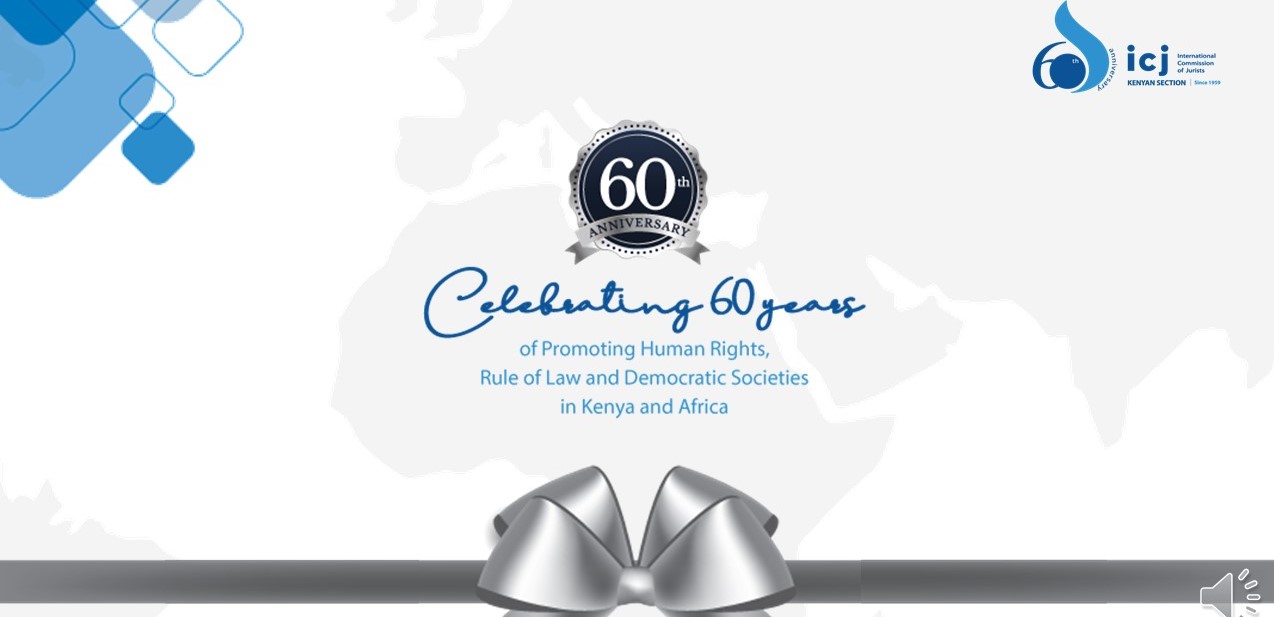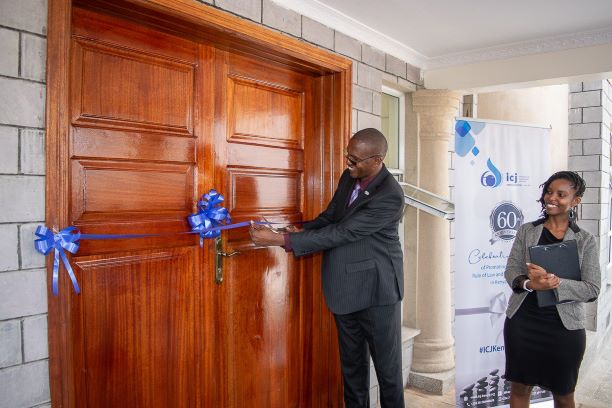Moses Okinyi
This year, we mark our 60th year of consistency in promoting progressive democratic and open societies, acting as a watchdog in promoting good governance, social cohesion, respect for the rule of law, promotion of human rights and accountability in Kenya and the region. ICJ Kenya has continued to play a critical role in complementing the government’s development efforts as well as being a critical counterbalance to government excesses during various phases of the country’s half century of independence.
Over the years we have gone through a lot of progress, successes and lessons learnt while implementing activities under our four programmes: Governance Programme; Access to Justice Programme; Human Rights Protection Programme; and International Cooperation Programme. ICJ-Kenya’s programmes strategic orientation are informed by the organization’s 2016-2020 Strategic Plan that commenced this year following a successful implementation of the previous Strategic Plan 2011-2015. The 2016-2020 plan provides broad strategic objectives, and explains the causal linkages between our mission, goals and programmatic approaches and activities.
ICJ Kenya’s programmes contributed to the empowerment of citizens to participate in democratic governance, and to the enhancement of the rule of law. We contributed to improved human rights protection, access to justice and the quality of justice sector institutions in the region.
We remained active in supporting parliamentary processes. We supported the drafting of the Freedom of Information Bill and the Legal Aid Bill, which have since been passed into Laws in Kenya. The Access to information Act 2016 a key lever for good governance, transparency, accountability and rule of law. The Legal Aid Act 2016, a law an Act of Parliament that facilitate access to justice and social justice; to establish the National Legal Aid Service; to provide for legal aid, and for the funding of legal aid and for connected purposes We also drafted a model access to information law for possible uptake by interested county governments. ICJ Kenya also worked to popularize these laws.
The criminal justice system in Kenya has been one of the core areas that require major reforms specifically the laws on Petty offences. Decriminalization of petty offences would be a suitable approach that would make our criminal justice system less punitive and less expensive. Criminalization of petty offences in Kenya has led to a lot of injustice especially to the poor who are affected disproportionately. In this regard, during the period under review, ICJ Kenya has been leading an ongoing regional campaign for decriminalization and reclassification of petty offences in Africa. At the National level, we coordinate the Task Force on Petty Offences in Kenya composed of national and community based organizations each working towards protection and promotion of rights if different vulnerable groups
ICJ Kenya has continued its support for accountability of crimes before International Criminal justice mechanisms; you recall our role at the ICC in relation to the 2007/8 post-election violence, and monitoring (on behalf of the United Nations Mechanism on International Tribunals) the trial by the Rwandan national courts of cases that would otherwise have been tried by the International Criminal Tribunal for Rwanda
The success of ICJ Kenya’s work was bolstered by the effective use strategic impact litigation to promote the incorporation of international standards in national legal systems. The litigation was carried out in Kenyan courts, and actions have also been launched before international mechanisms such as the African Commission on Human and Peoples’ Rights (ACHPR), the East Africa Court of Justice (EACJ) and the International Criminal Court (ICC).
Taking a brief look at the domestic context and geopolitical situation around the region and internationally, ICJ Kenya interventions have been progressive and designed to full realization of our objectives, including; aggressively protecting the shrinking civil space and crackdown on Civil Society Organisations especially those that dare to call the state to account namely AFRICOG, IDLO and KHRC; rising levels of impunity by state actors who bear the primary responsibility for protection of rights; increasing corruption and misappropriation of public funds at both national and county levels; disregard for international, regional and domestic legal frameworks that command respect for the rule of law, democratic governance and adherence to set human rights standards.
The period 2017 saw us live through a build-up of electoral and other forms of violations, threats, harassment and intimidation of both political aspirants and voters in the period preceding the political party nominations, during nominations through to the August 2017 election and the post-election period. In this era of election petitions, the country has also witnessed attempts at curtailing the independence of the judiciary before and after its ruling which nullified the August 2017 presidential elections. ICJ Kenya noted with concern the subsequent use of force, intimation, harassment and propaganda to intimidate judicial officers from fulfilling their mandate as an independent body, to guarantee free, fair and credible elections. Our work towards free fair and credible elections also came under heavy threats and attack.
At the global and regional level, we witnessed the political debate on Kenya’s possible withdrawal from the Rome Statute; and Kenya’s failure to send a delegation to the 68th Session of the Committee on the Convention on elimination of all forms of discrimination against women (CEDAW) despite the fact that Kenya was scheduled for review on the basis of its 8th Periodic Report and its obligations under the convention.
On a positive note, however, we have seen a lot of success at the international level. The success of the Ogiek case before the African Court on Human and People’s rights that set a major precedent for indigenous peoples’ land rights, and the African Commission on Human and People’s Rights’ statements which called on the Kenya government to address extra judicial killings in the country. In 2017, the Principles on the Decriminalisation of Petty Offences in Africa were adopted by the African Commission, becoming the latest development in a broader regional effort to articulate standards for acceptable human rights practices, specifically concerning matters of access to justice.
As an organisation, our programmatic interventions thrive on cutting edge research, legal analysis, comparative jurisprudence, publication and dissemination of demand driven evidence based research on isolated but interdependent thematic areas of human rights, democracy and rule of law concerns across Kenya and the region. These research findings inform our advocacy engagement with duty bearers, development of projects and programming.
These are just some of the successes that ICJ Kenya has recorded over the past few years. For sure ICJ Kenya is poised to grow further and become an even better agency in the promotion of human rights, governance and the rule of law.











